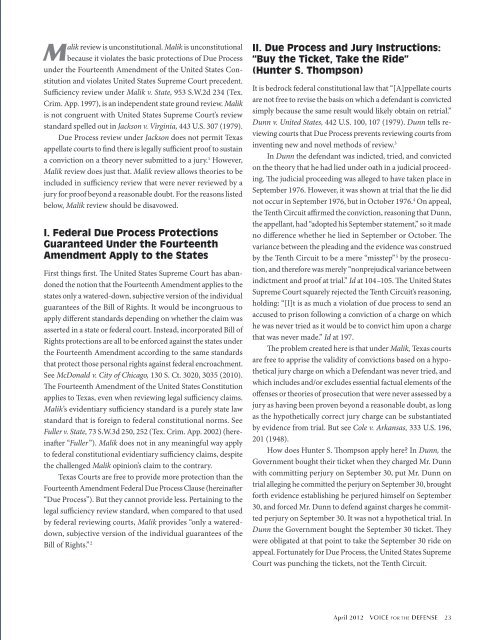for the defense for the defense - Voice For The Defense Online
for the defense for the defense - Voice For The Defense Online
for the defense for the defense - Voice For The Defense Online
Create successful ePaper yourself
Turn your PDF publications into a flip-book with our unique Google optimized e-Paper software.
Malik review is unconstitutional. Malik is unconstitutionalbecause it violates <strong>the</strong> basic protections of Due Processunder <strong>the</strong> Fourteenth Amendment of <strong>the</strong> United States Constitutionand violates United States Supreme Court precedent.Sufficiency review under Malik v. State, 953 S.W.2d 234 (Tex.Crim. App. 1997), is an independent state ground review. Malikis not congruent with United States Supreme Court’s reviewstandard spelled out in Jackson v. Virginia, 443 U.S. 307 (1979).Due Process review under Jackson does not permit Texasappellate courts to find <strong>the</strong>re is legally sufficient proof to sustaina conviction on a <strong>the</strong>ory never submitted to a jury. 1 However,Malik review does just that. Malik review allows <strong>the</strong>ories to beincluded in sufficiency review that were never reviewed by ajury <strong>for</strong> proof beyond a reasonable doubt. <strong>For</strong> <strong>the</strong> reasons listedbelow, Malik review should be disavowed.I. Federal Due Process ProtectionsGuaranteed Under <strong>the</strong> FourteenthAmendment Apply to <strong>the</strong> StatesFirst things first. <strong>The</strong> United States Supreme Court has abandoned<strong>the</strong> notion that <strong>the</strong> Fourteenth Amendment applies to <strong>the</strong>states only a watered-down, subjective version of <strong>the</strong> individualguarantees of <strong>the</strong> Bill of Rights. It would be incongruous toapply different standards depending on whe<strong>the</strong>r <strong>the</strong> claim wasasserted in a state or federal court. Instead, incorporated Bill ofRights protections are all to be en<strong>for</strong>ced against <strong>the</strong> states under<strong>the</strong> Fourteenth Amendment according to <strong>the</strong> same standardsthat protect those personal rights against federal encroachment.See McDonald v. City of Chicago, 130 S. Ct. 3020, 3035 (2010).<strong>The</strong> Fourteenth Amendment of <strong>the</strong> United States Constitutionapplies to Texas, even when reviewing legal sufficiency claims.Malik’s evidentiary sufficiency standard is a purely state lawstandard that is <strong>for</strong>eign to federal constitutional norms. SeeFuller v. State, 73 S.W.3d 250, 252 (Tex. Crim. App. 2002) (hereinafter“Fuller”). Malik does not in any meaningful way applyto federal constitutional evidentiary sufficiency claims, despite<strong>the</strong> challenged Malik opinion’s claim to <strong>the</strong> contrary.Texas Courts are free to provide more protection than <strong>the</strong>Fourteenth Amendment Federal Due Process Clause (hereinafter“Due Process”). But <strong>the</strong>y cannot provide less. Pertaining to <strong>the</strong>legal sufficiency review standard, when compared to that usedby federal reviewing courts, Malik provides “only a watereddown,subjective version of <strong>the</strong> individual guarantees of <strong>the</strong>Bill of Rights.” 2II. Due Process and Jury Instructions:“Buy <strong>the</strong> Ticket, Take <strong>the</strong> Ride”(Hunter S. Thompson)It is bedrock federal constitutional law that “[A]ppellate courtsare not free to revise <strong>the</strong> basis on which a defendant is convictedsimply because <strong>the</strong> same result would likely obtain on retrial.”Dunn v. United States, 442 U.S. 100, 107 (1979). Dunn tells reviewingcourts that Due Process prevents reviewing courts frominventing new and novel methods of review. 3In Dunn <strong>the</strong> defendant was indicted, tried, and convictedon <strong>the</strong> <strong>the</strong>ory that he had lied under oath in a judicial proceeding.<strong>The</strong> judicial proceeding was alleged to have taken place inSeptember 1976. However, it was shown at trial that <strong>the</strong> lie didnot occur in September 1976, but in October 1976. 4 On appeal,<strong>the</strong> Tenth Circuit affirmed <strong>the</strong> conviction, reasoning that Dunn,<strong>the</strong> appellant, had “adopted his September statement,” so it madeno difference whe<strong>the</strong>r he lied in September or October. <strong>The</strong>variance between <strong>the</strong> pleading and <strong>the</strong> evidence was construedby <strong>the</strong> Tenth Circuit to be a mere “misstep” 5 by <strong>the</strong> prosecution,and <strong>the</strong>re<strong>for</strong>e was merely “nonprejudical variance betweenindictment and proof at trial.” Id at 104–105. <strong>The</strong> United StatesSupreme Court squarely rejected <strong>the</strong> Tenth Circuit’s reasoning,holding: “[I]t is as much a violation of due process to send anaccused to prison following a conviction of a charge on whichhe was never tried as it would be to convict him upon a chargethat was never made.” Id at 197.<strong>The</strong> problem created here is that under Malik, Texas courtsare free to apprise <strong>the</strong> validity of convictions based on a hypo<strong>the</strong>ticaljury charge on which a Defendant was never tried, andwhich includes and/or excludes essential factual elements of <strong>the</strong>offenses or <strong>the</strong>ories of prosecution that were never assessed by ajury as having been proven beyond a reasonable doubt, as longas <strong>the</strong> hypo<strong>the</strong>tically correct jury charge can be substantiatedby evidence from trial. But see Cole v. Arkansas, 333 U.S. 196,201 (1948).How does Hunter S. Thompson apply here? In Dunn, <strong>the</strong>Government bought <strong>the</strong>ir ticket when <strong>the</strong>y charged Mr. Dunnwith committing perjury on September 30, put Mr. Dunn ontrial alleging he committed <strong>the</strong> perjury on September 30, brought<strong>for</strong>th evidence establishing he perjured himself on September30, and <strong>for</strong>ced Mr. Dunn to defend against charges he committedperjury on September 30. It was not a hypo<strong>the</strong>tical trial. InDunn <strong>the</strong> Government bought <strong>the</strong> September 30 ticket. <strong>The</strong>ywere obligated at that point to take <strong>the</strong> September 30 ride onappeal. <strong>For</strong>tunately <strong>for</strong> Due Process, <strong>the</strong> United States SupremeCourt was punching <strong>the</strong> tickets, not <strong>the</strong> Tenth Circuit.
















